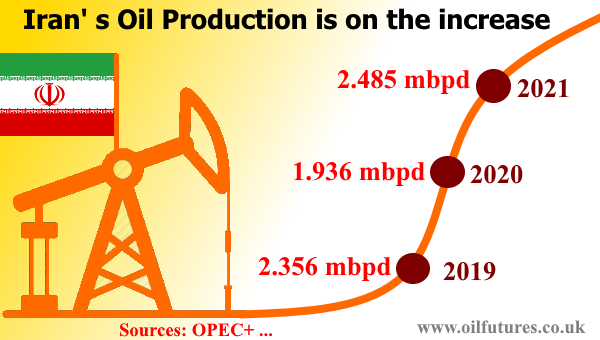According to the latest report on oil productions by
the member states by the OPEC+, the Iranian crude oil output for July shows an
increase by 28%, compared to the output for the same month last year.
The figure for July, 2021 stood at 2.485 million bpd
and it was 1.936 million bpd for the same period in 2020.
The pandemic clearly accounts for the relatively low
output in 2020. Despite being under the US-led sanctions, the increased
production this year, however, coincides with numerous reports that say the crude
oil production activities in Iran is gathering momentum.
During the first few months of the Biden
administration, the crude oil production in Iran started accelerating in
proportion to the prevailing hope of reviving the JCPOA, 2015 Iran nuclear deal,
at that time.
There were a few false dawns during that period: at
some point, Mr Hassan Rouhani, the then Iranian president, riding on a wave of
optimism, even said that a deal was imminent with the signatories to the
nuclear deal – only to find that was not the case in the full glare of
publicity in a matter of few hours.
Neither Iran nor the rest of the signatories to the
JCPOA has given up on reviving the deal, though. The fact that neither side
turned the back on the talks shows that the likelihood of meeting up again in
Vienna over the discussions is still possible, despite the progress being in
limbo for some time.
At present, Iran is going through a difficult period
in the face of rising infections and deaths due to clusters of Covid-19 across
the country; falling oil revenues have made matters worse for Iran when it
comes to buying vital medicines, equipment and even vaccines.
Certain high ranking officials in the new Iranian
administration blamed the previous administration on failure to buy vaccines
against Covid-19, citing the cost. The former administration, in turn, hit back
at the claim by saying that was not the case.
In addition, the frequent power-cuts, prevailing
droughts in arid regions and water shortages have created additional problem
for the authorities, none of which has quick-fix solutions.
The alleged Iranian involvement in the attack
against an Israel-registered ship dealt a severe blow to Iran’s ambition to
returning to the crude oil markets as a normal trader, despite its strong
denial.
Although the US said that there would be a ‘proportional
response’ at the height of the tension involving the tanker in question, the possibility
of retaliation has since somewhat gone down with a slight deviation of the
accusation from Iran – towards a militant group in Yemen.
Iran has been ramping up the oil production in recent
months in the hope that President Raisi, the newly elected president, will
choose pragmatism over rigid ideology in order to address serious economic
challenges, which could potentially make the public turn against the
government.
That means there is still a ray of hope of reviving
the JCPOA – against many odds at present.







